Brazil is unarguably the most successful and popular footballing nation in history, the yellow and blue jersey worn by the national team of Brazil is instantly recognizable anywhere in the world. The Samba boys have produced iconic players over the years, with a lot of their legends considered among the greatest of all time.
The attacking and skilful nature of the average Brazilian means that more attention and emphasis is placed on their attack-minded players such as Pele, Zico, Romario, Ronaldo and Ronaldinho and rarely are the defensive players spoken about. Football is a team sport and despite all of their attacking brilliance, a lot of defenders have contributed immensely to Brazil's success over the years. Here are the 7 greatest Brazilian defenders of all time.
Honourable mentions - Domingos da Guia, Branco, Jose Oscar Bernardi, Roque Junior, Hilderaldo Bellini, Thiago Silva
#7 Aldair
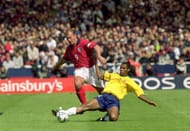
The most capped foreign player in Roma's history, Aldair was well known for his tough tackling and good technique with the ball. His versatility enabled him to function as a sweeper and when his team was chasing a game, Aldair frequently stepped up into midfield as a makeshift midfielder due to his effectiveness at precise long balls.
'Pluto' as he was affectionately called in Roma joined the Italian capital club in 1990 from Benfica where he spent only one season, winning the Portuguese cup. He had also tasted success in his native Brazil with Flamengo where he won the Campeonato Brasileiro.
At Roma, Aldair went on to achieve legendary status, making 330 appearances in the Serie A and won the Scudetto and Super Coppa Italiana in 2001, in addition to the Coppa Italia of 1991. For his achievements, the Rio de Janeiro native was inducted into the Roma Hall of fame in 2012 and had his jersey number 6 retired when he left the club after 13 years in 2003, although the jersey was brought out of retirement in 2013 and handed to Kevin Strootman with Aldair's consent.
With the Brazil National team, Aldair was equally as successful, winning 80 caps between 1989 and 2000, scoring 3 goals. He was part of the Brazilian squads at the 1990, 1994 and 1998 World Cups, winning the 1994 edition and finishing as a runner-up in 1998. He also participated at three Copa Americas, winning the continental tournament in 1989 and 1997 and was part of the Brazilian team that won the Confederations Cup in 1997. He was included in the FIFA World XI of 2000.
#6 Lucio
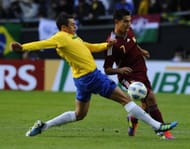
Famed for his tough tackling, no-holds-barred style of defending, Lucio was one of the best defenders in his generation and was very effective at winning back possession in one on one situations. Though primarily a centre-back, his confidence and technique in ball distribution meant he was sometimes deployed as a defensive midfielder. His height made him excel in the air and he was efficient at both defending and attacking set pieces.
He gained prominence in his native Brazil with Internacional where he won the 2000 Bola De Prata as one of the two best centre-backs in the league. He transferred to Europe in January 2001, signing for Bayer Leverkusen in the German Bundesliga and had a bittersweet first full season with the club in 2002 as although he performed very well on an individual level, his club contested for and lost three titles in the space of three weeks; throwing away a five-point lead over Dortmund in the league by losing two of their final three matches to finish second, losing the DFP Pokal final 4-2 to Schalke 04 and finishing as runners-up in the 2002 Champions League final in a 2-1 defeat to Real Madrid (where Lucio scored a 13th minute header).
He transferred to Germany's biggest club Bayern Munich in 2004 and spent five highly successful years at the club, winning three Bundesliga titles, three DFB Pokals and two DPB Liga-Pokals. With a year left on his Munich contract, in 2009 Lucio joined then Italian champions Inter Milan managed by Jose Mourinho.
Partnering Walter Samuel in the centre of defence, Lucio helped Inter Milan create history by becoming the first Italian team to win a treble of Serie A, Coppa Italia and Champions League. His efficient positioning and superb defending were crucial to Inter winning the Champions League after 45 years as Mourinho deployed ultra-defensive tactics especially in the semi-final ties against Barcelona and Lucio showed the requisite dedication over the two legs for Inter to progress. His efforts that season led to him being included in the FIFPRO XI for 2010.
He transferred to Italian league holders Juventus, and although he was initially a starter, Lucio later lost his place in a back three to Chiellini, Barzagli and Bonnucci. He left Juventus in 2012 and returned to Brazil.
With his national team, Lucio was equally as successful, winning 100 caps between 2000 and 2011 and was an instrumental part of the squad that won Brazil its fifth world title in 2002, being one of three players to play all 603 minutes (alongside Cafu and goalkeeper Marcos) en route their triumph. He was also victorious in the 2005 Confederations Cup.
He set a World Cup record for a defender by going 386 consecutive minutes without a foul in the 2006 World Cup before Brazil's quarterfinal loss to France. After the retirement of Cafu, Lucio was named Brazil's captain in 2006 and skippered his country to victory in the 2009 Confederations Cup where he scored a header in the final against the United States.
#5 Roberto Carlos
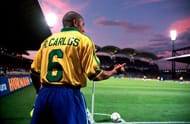
Famed for the marauding runs forward associated with Brazilian full-backs, Roberto Carlos was a mainstay in the Brazilian national team setup as the left-full-back for over a decade and was one of the most popular footballers in the late 20th century.
A specialist at free kicks, Carlos is considered by many to be the most offensive left-back in the history of the game. He was nicknamed El Hombre Bala (The Bullet Man) due to his powerful free kicks which were measured at over 169 km/ hour. He was also prominent for his blistering speed, crossing ability and technical skills. In 2004, Pele named him among the FIFA 100 list of world's greatest living players.
Roberto Carlos's sojourn to Europe began with his 1996 transfer to Spanish and European heavyweights Real Madrid and he went on to spend 11 highly successful seasons at the club, making 512 appearances in all competitions (the highest for a foreigner in the club's history).
At Real Madrid, he forged his reputation as the best left-back in the world and was voted as the runner-up in the 1997 FIFA World Best and 2002 Ballon d'Or awards, both to compatriot Ronaldo. He was instrumental as Real Madrid ended its 32-year wait for Champions League victory in 1998 and it was his pinpoint delivery in the 2002 Champions League final after a bursting run forward that enabled Zinedine Zidane to score the winning volley which is considered one of the greatest Champions League goals of all time.
He left Real Madrid in 2007 after their La Liga triumph and ended his spell at the Bernabeu with a plethora of trophies including 4 La Liga titles, 3 Champions League crowns, 3 Supercopa de Espana, 1 UEFA Super Cup and two Intercontinental Championships.
On leaving Real Madrid, Roberto Carlos spent the next six seasons playing for Fernabache, Corinthians and Anzhi Makhachkala, winning the Super Cup twice in Turkey.
With Brazil, Roberto Carlos is the second highest appearance maker of all time, getting 125 caps for the Brazilian national team between 1992 and 2006, he represented his nation at three World Cup tournaments, including the sides who finished as winners in 2002 and runners-up in 1998; being voted into the team of the tournament of both competitions. He was also victorious in the Copa Americas of 1997 and 1999 as well as the Confederations Cup in 1999.
Roberto Carlos is unarguably one of the greatest Brazilian players of all time more so as a defender and was deservedly voted into the World Cup All-star dream team in 2002.
#4 Nilton Santos
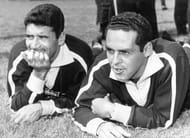
Before Marcelo and Roberto Carlos made a name for themselves as marauding Brazilian left-backs contributing to attacks, there was a Nilton Santos who was one of the first full-backs to push forward in support of attacks for his team in the 1950s.
A converted forward, Nilton Santos is considered one of the greatest defenders in the history of the game and was part of the Brazilian squads in four consecutive World Cups between 1950 and 1962 (he failed to make an appearance at the 1950 edition), winning the Jules Rimet Trophy in 1958 and 1962.
The late Nilton Santos (he passed on in November 2013 aged 88, few months to the commencement of the 2014 World Cup in his native Brazil) spent the entirety of his club career with Botafogo, making 723 appearances and won six titles with his hometown club.
'The Encyclopedia' as he was called due to his extensive knowledge of sports reinvented the fullback role and regularly contributed to attacks with his runs down the wing and scored a memorable goal in the 1958 World Cup against Austria after dribbling across the field before unleashing a shot into the Austrian goal. He also had an impact on Brazilian football history by being a mentor to Botafogo teammate Garrincha who was the star of Brazil's World Cup triumph in 1962, helping guide the prodigiously talented but undisciplined Garrincha on the right path.
Adept at both defending an attacking, Nilton won 75 caps for Brazil between 1949 and 1962, scoring three goals and was voted in the 1958 World Cup All-Star Team as well as the World Team of the 20th Century in 1998 and was included in Pele's FIFA 100 Greatest living players of all time in 2004. He is also a member of Brazil's Football Museum Hall of Fame.
#3 Carlos Alberto Torres
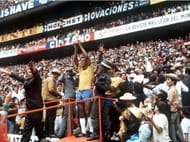
The progenitor of marauding right-backs, Nilton Santos invented the role, while Carlos Alberto reinvented it and laid the template for future full-backs to follow after his eye-catching performances in Brazil's 1970 World Cup triumph was propagated to millions all over the world due to an increased global audience.
'O Capitão do Tri' or 'The Third Captain' in reference to his role as the third Brazilian captain to lift the World Cup is considered one of the greatest defenders of all time and made a name for himself due to his excellent tackling, reading of the game, dribbling and playmaking (which were quite rare at that time for a defender) in the Brazilian league with Fluminense with whom he won 4 trophies between 1963 and 1966, before teaming up with Pele at Santos.
At Santos, the fame of Pele had thrust the club into international prominence and Carlos Alberto benefited from this as he became a mainstay of the national team during this period and was handed the captain's armband heading into the 1970 World Cup. His time at Santos yielded six trophies.
With Brazil, Torres earned 58 caps scoring 8 goals and those figures would undoubtedly have been higher but for a knee injury that hampered him from 1973 on. He captained Brazil to its third World Cup in Mexico 1970 and scored a beautiful team goal in the final against Italy which is considered by many to be one of the greatest goals in World Cup history.
A true legend of the game, Carlos Alberto was part of the 1970 World Cup All-Star Team and, the World Team of the 20th Century in 1998, he was also included in Pele's FIFA 100 list in 2004 and is a member of the Brazilian Football Museum Hall of Fame.
#2 Cafu
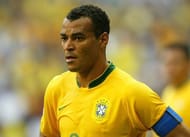
The natural successor to Carlos Alberto Torres, Cafu followed in his footsteps by captaining Brazil to a World Cup triumph in 2002, playing all 603 minutes as Brazil lifted its fifth World title in Japan. With 142 caps, he is Brazil's all-time highest appearance maker and holds the distinction of being the only man to play in the final of three consecutive World Cup tournaments, doing so as a victor in the 1994 and 2002 editions and as a runner-up in 1998.
He started his senior club career at Sao Paulo in 1989 and his six-year stay at the club was immensely successful, winning consecutive Copa Libertadores and Intercontinental Cups (precursor to the Club World Cup) in 1992 and 1993. He ended his spell at Sao Paulo in 1995 with his transfer to Real Zaragoza, having won seven senior titles in Brazil.
His spell in Spain was not so notable although he won the 1995 European Cup Winners Cup with the La Liga club. After a brief stint back in Brazil, Cafu returned to Europe in 1997, this time in the Serie A with Roma and won the hearts of the Giallarossi faithful with his impressive displays, earning the nickname 'Il Pendolino' (The Express Train) due to his explosive forays down the Roma right flank.
With the Italian capital club, he won the Scudetto in 2001 before moving on to another Italian giant AC Milan in 2003. At Milan, he added the second scudetto of his career in 2004, two UEFA Super Cups (2003, 2007), the Super Coppa Italia in 2004, the 2007 Champions League (making him one of few players to have won the club continental titles in South America and Europe) and the 2007 FIFA World Club Cup. He announced his retirement from football at the expiration of his Milan contract in 2008 and is a member of both the Milan and Roma Hall of Fame.
With Brazil, he participated at four consecutive World Cups from 1994 to 2006, captaining his country at the latter two and set a record of making 21 appearances in total at the World Cup. He was also part of the victorious Brazilian squads at the 1997 and 1999 Copa America as well as the 1999 Confederations Cup.
On a personal level, Cafu was a part of Pele's FIFA 100 in 2004, he was also included in the World XI of the 21st century as well as the FIFA XI in 2002. Other personal milestones achieved in his career include being voted South American Player of the Year in 1994 and making it into the UEFA Team of the Year in 2004 and 2005.
For all his personal and team achievements, and his consistency for so long, Cafu is deservedly recognized as one of the greatest fullbacks of all time and he is without a doubt a legend of the game.
#1 Djalma Santos
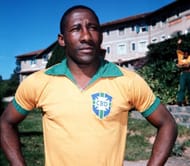
The late Djalma Santos was one of the mainstays in the great Brazilian teams of the 1950s and 1960s. He represented his country at four consecutive World Cups from 1954 to 1966, winning the 1958 and 1962 editions. He became the first player to appear in three separate World Cup All-Star teams (1954, 1958 and 1962). A record he now shares with Franz Beckenbauer and Philip Lahm.
He spent most of his professional club career with Palmeiras, with whom he made over 500 appearances and won seven domestic titles.
With Brazil, he won a total of 98 caps between 1952 and 1968 which was a long time record until it was broken by Taffarrel almost 30 years later in 1998. He started in all of Brazil's games at the 1954 World Cup as they finished fourth, scoring one goal which led to his inclusion in the team of the tournament.
In the 1958 World Cup, he lost his starting position to De Sordi, only playing in the 5-2 victory over hosts Sweden in the final, but his dominant performance in that single match was enough to earn him a spot in the team of the tournament.
He was once more a regular as Brazil retained her World title in Chile 1962, setting up a goal for Vava in the final against Czechoslovakia with a beautiful lobbed pass and was once again included in the team of the tournament.
Primarily deployed as a right-back, where he terrorized opposition flanks alongside partner-in-crime Nilton Santos, Djalma's versatility meant that he could also be deployed as a centre-back. He was quick and physically imposing, earning the nickname 'la Muralha' (The Wall). Famed for his dribbling, excellent technique, and accurate distribution, Djalma along with Nilton were among the earliest full backs to contribute to their team's attacks by venturing forward. He was also a specialist in the art of long throw-ins and used this ability to devastating effect in favour of his teams.
In addition to his extraordinary abilities as a footballer, Djalma Santos was also an exemplary sportsman and was never sent off in his long and distinguished career. A true legend of the Brazilian and World game, Djalma Santos is one of a few players to have played over 1,000 professional games (a rare feat in his era) and was a part of Pele's FIFA 100 in 2004, as well as the FIFA World Cup All-Time Team in 2004 and is a member of the Brazil football Hall of Fame.
